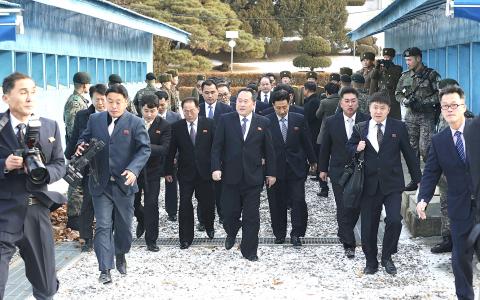North Korea is to send its athletes to the Winter Olympics in the South next month, the rivals said yesterday after their first formal talks in more than two years.
The two sides also decided to hold military talks to ease tensions and to restore a military hotline closed since February 2016.
Seoul and Olympic organizers have been keen for Pyongyang — which boycotted the 1988 Seoul Summer Games — to take part in what they repeatedly proclaimed a “peace Olympics” in Pyeongchang.

Photo: AP / Yonhap
“The North Korean side will dispatch a National Olympic Committee delegation, athletes, cheerleaders, art performers’ squad, spectators, a taekwondo demonstration team and a press corps, and the South will provide necessary amenities and facilities,” they said in a joint statement.
Yesterday’s talks were held in Panmunjom, the truce village in the Demilitarized Zone.
The North’s delegation walked over the Military Demarcation Line marking the border to the Peace House venue on the southern side, just meters from where a defector ran across in a hail of bullets two months ago.
Looking businesslike, the South Korean Minister of Unification Cho Myoung-gyon and the North’s chief delegate, Ri Son-gwon, shook hands at the entrance to the building and again across the negotiating table.
“Let’s present the people with a precious new year’s gift,” Ri said. “There is a saying that a journey taken by two lasts longer than the one traveled alone.”
The atmosphere was friendlier than at past meetings, and Cho told Ri: “The people have a strong desire to see the North and South move toward peace and reconciliation.”
However, there was no mention in the joint statement of a proposal by Seoul to resume reunions of families left divided by the Korean War, or of an offer by the North to send a high-level delegation to the Games.
Only two athletes from the North have qualified for the Games so far, but hundreds of young female North Korean cheerleaders have created a buzz at three previous international sporting events in the South.
The group might stay on a cruise ship in Sokcho, about an hour’s drive from the Olympic venue.
According to South Korean reports, any high-level delegation accompanying the team could include North Korean leader Kim Jong-un’s younger sister, Yo-jong, who is a senior member of the ruling Workers’ Party.
Both sides expressed the desire to address wider questions, but Pyongyang has snubbed previous attempts by Seoul to set up further family reunions, saying it would not do so unless several of its citizens are returned by the South.
“The South and the North agreed to activate cross-border contacts, passages, exchanges and cooperation, and to seek national reconciliation and unity in various sectors,” the statement said, without giving details.
It was unclear when the proposed military talks — which would be the first of their kind since 2014 — would be held.
“The two sides will reach a smooth agreement on Pyeongchang, but what happens afterward?” Dongguk University professor Koh Yu-hwan said before the announcement. “In terms of pending issues regarding the improvement of inter-Korean ties, it won’t be easy to immediately reach an agreement.”

SECURITY: As China is ‘reshaping’ Hong Kong’s population, Taiwan must raise the eligibility threshold for applications from Hong Kongers, Chiu Chui-cheng said When Hong Kong and Macau citizens apply for residency in Taiwan, it would be under a new category that includes a “national security observation period,” Mainland Affairs Council (MAC) Minister Chiu Chui-cheng (邱垂正) said yesterday. President William Lai (賴清德) on March 13 announced 17 strategies to counter China’s aggression toward Taiwan, including incorporating national security considerations into the review process for residency applications from Hong Kong and Macau citizens. The situation in Hong Kong is constantly changing, Chiu said to media yesterday on the sidelines of the Taipei Technology Run hosted by the Taipei Neihu Technology Park Development Association. With

CARROT AND STICK: While unrelenting in its military threats, China attracted nearly 40,000 Taiwanese to over 400 business events last year Nearly 40,000 Taiwanese last year joined industry events in China, such as conferences and trade fairs, supported by the Chinese government, a study showed yesterday, as Beijing ramps up a charm offensive toward Taipei alongside military pressure. China has long taken a carrot-and-stick approach to Taiwan, threatening it with the prospect of military action while reaching out to those it believes are amenable to Beijing’s point of view. Taiwanese security officials are wary of what they see as Beijing’s influence campaigns to sway public opinion after Taipei and Beijing gradually resumed travel links halted by the COVID-19 pandemic, but the scale of

A US Marine Corps regiment equipped with Naval Strike Missiles (NSM) is set to participate in the upcoming Balikatan 25 exercise in the Luzon Strait, marking the system’s first-ever deployment in the Philippines. US and Philippine officials have separately confirmed that the Navy Marine Expeditionary Ship Interdiction System (NMESIS) — the mobile launch platform for the Naval Strike Missile — would take part in the joint exercise. The missiles are being deployed to “a strategic first island chain chokepoint” in the waters between Taiwan proper and the Philippines, US-based Naval News reported. “The Luzon Strait and Bashi Channel represent a critical access

Pope Francis is be laid to rest on Saturday after lying in state for three days in St Peter’s Basilica, where the faithful are expected to flock to pay their respects to history’s first Latin American pontiff. The cardinals met yesterday in the Vatican’s synod hall to chart the next steps before a conclave begins to choose Francis’ successor, as condolences poured in from around the world. According to current norms, the conclave must begin between May 5 and 10. The cardinals set the funeral for Saturday at 10am in St Peter’s Square, to be celebrated by the dean of the College